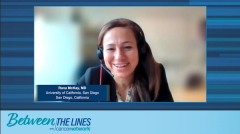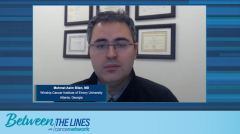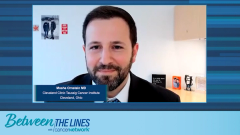
A Physician’s Take on the CLEAR Trial Data
Brian Shimkus, MD, shares his opinion of data on lenvatinib and pembrolizumab from the CLEAR trial.
Episodes in this series

Tom Powles, MBBS, MRCP, MD: Hi, I'm Tom Powles. I'm an oncologist from London. I look after patients with urology cancers, particularly bladder and kidney cancer, which we're talking about today. Brian, would you like to introduce yourself?
Brian Shimkus, MD: Yes. I'm Brian Shimkus. I'm a physician in Austin, Texas; private practice in a multi-specialty group. I don't specialize in any particular kind of cancer, but I enjoy genitourinary cancers and work closely with a very large group close to us. I've always been fond of treating renal cell carcinoma.
Tom Powles, MBBS, MRCP, MD: Brian, we just saw Bob Watson present the CLEAR data published in New England Journal [of Medicine]. There's been a later data cut more recently. The data looked impressive, with the response rate above 70%. The hazard ratio for PFS in the 0.39, I think, and the OS survival data significant at about 0.70. The total RB profile was okay. I think these combinations are challenging to give, more challenging than the single agent therapy, certainly. What was your take on the data overall in the paper?
Brian Shimkus, MD: I think it's amazing. If you look back, I've been practicing for about 20 years and going from renal cell carcinoma as a disease with interleukin therapy as the only option to something where we have all of these options, and now can decide how we want to treat people based on side effect profiles. It really gives them a bright outcome now. I've gone from treating people with single agents to getting better at treatment with multi-agent therapy. I think that really is the key here, as I see in this study. That's one of the big take-away points, is that the better you get at this, the more experience you have with multi-agent therapy, the better your patients are going to do. It becomes critical to understand how best to use these drugs, not just knowing which drugs are available.
Transcript edited for clarity.
Newsletter
Stay up to date on recent advances in the multidisciplinary approach to cancer.

















































